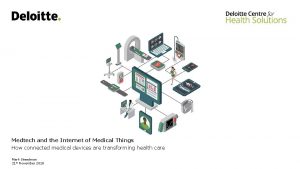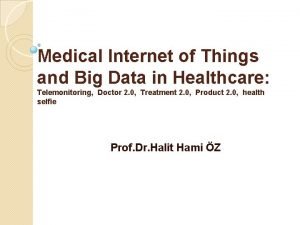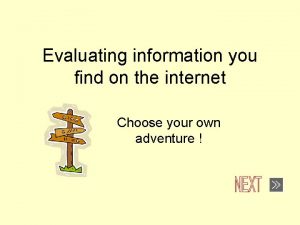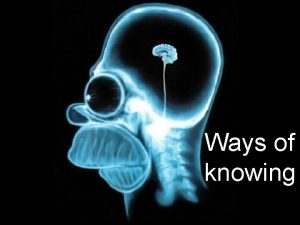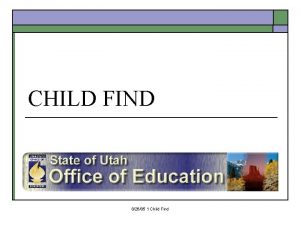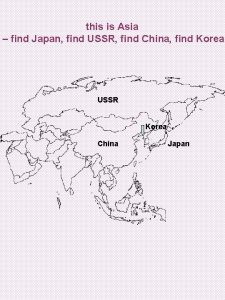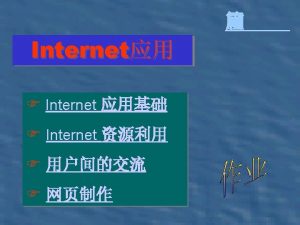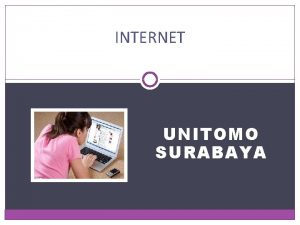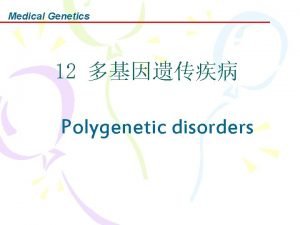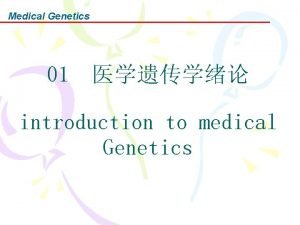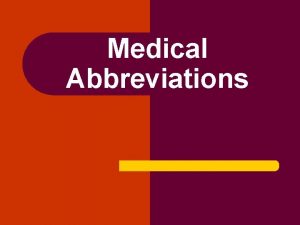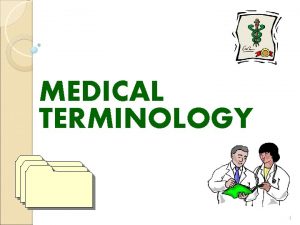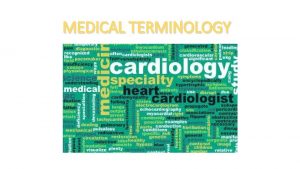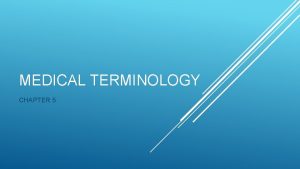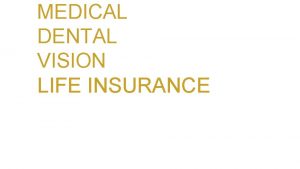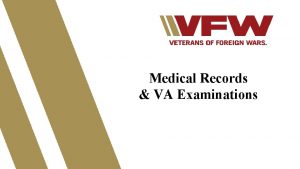WAYS TO FIND MEDICAL INFORMATION ON THE INTERNET































- Slides: 31

WAYS TO FIND MEDICAL INFORMATION ON THE INTERNET

WEB SEARCH TOOLS Main types of web search tools § subject directories § search engines § meta-search engines § concept categorizing search engines § vertical search engines

THINGS TO KNOW ABOUT SUBJECT DIRECTORIES § selective collections of web pages or other information sources arranged by topic, hierarchically organized by subject category § assembled by teams of editors who are specialists in their subjects § information retrieval is realized by browsing catalog section, sometimes the searching by keyword is offered as well

WHEN TO USE SUBJECT DIRECTORIES § when you are just beginning your search and have only a general idea of a topic § when you are interested in a broad range of information rather than a specific piece of information § when you are looking for a list compiled by an expert, this helps eliminate irrelevant pages and ensures quality results

RECOMMENDED SUBJECT DIRECTORIES General § Yahoo! Directory – www. dir. yahoo. com § DMOZ – www. dmoz. org Academic & professional § Infomine – www. infomine. ucr. edu Encyclopedias, Dictionaries § The Free Dictionary – www. thefreedictionary. com § Mashpedia – www. mashpedia. com § Medline. Plus (Encyclopedia) – www. nlm. nih. gov/medlineplus/encyclopedia. html

THINGS TO KNOW ABOUT SEARCH ENGINES § searchable databases compiled by automated programs that continuously search the full-texts of the web pages for new and updated sites § vary in method, type and amount of material indexed § vary in relevancy of achieved results § operate by entry of keywords

WHEN TO USE SEARCH ENGINES § when you have a specific topic § when you want to combine relevant terms § when you want to retrieve a large number of web sites

RECOMMENDED SEARCH ENGINES General search engines § Google – www. google. com § Yahoo! – www. yahoo. com § Ask – www. ask. com § Excite – www. excite. com § Bing – www. bing. com Academic search engines § BASE – www. base-search. net § Science. gov – www. science. gov – government science portal

THINGS TO KNOW ABOUT META-SEARCH ENGINES § search tools of a federated search provide a single interface that enables users to search multiple search engines, indexes and databases simultaneously § do not offer the same level of control over the search interface and search logic as individual search engines

WHEN TO USE META-SEARCH ENGINES § when you want to get a general idea of what documents you can find with your terms § a good strategy at the very beginning of your research

RECOMMENDED META-SEARCH ENGINES General meta-search engines § Excite –msxml. excite. com § Ixquick –www. ixquick. com § Dogpile – www. dogpile. com § Yippy –www. yippy. com § Search. com – www. search. com Academic meta-search engines § Academic Index – www. academicindex. net § Google Scholar – www. scholar. google. com/schhp § Research. Gate – www. researchgate. net § Academia. edu – www. academia. edu

CONCEPT CATEGORIZING SEARCH ENGINES When to use concept categorizing search engines § when a search is a general one and you want to learn about the component concepts of your topic § when you know very little about your topic and want help in identifying its scope and content § when your topic is indefinite

RECOMMENDED CONCEPT CATEGORIZING SEARCH ENGINES § i. Boogie – www. iboogie. com § Theoma – www. teoma. com § Wise. Nut – www. wisenut. com § Open Directory – www. dmoz. org § Med. Explorer – www. medexplorer. com

VERTICAL SEARCH ENGINES When to use vertical search engines § when you search a specific area of the World Wide Web (WWW) – topic, geographical location, language, news, type of content (e. g. movies, images, blogs), etc. ) § when you have difficulty locating what you want on general, meta, or concept categorizing search engines

RECOMMENDED VERTICAL SEARCH ENGINES Topical search engines § § § Med. Nar – www. mednar. com/mednar Science. Research. com – www. scienceresearch. com World Wide Science – www. worldwidescience. org Image search engines § § Library of Congress Prints & Photographs Online Catalog – www. loc. gov/pictures Picsearch – www. picsearch. com Full text books and articles § § Google Book Search – www. books. google. com The Online Books Page – www. onlinebooks. library. upenn. edu

THE CONTENT OF THE WORLD WIDE WEB AND ITS ACCESSIBILITY § the Surface web (Visible web) – the information you can see in almost all subject directories and information you can find using general web search engines § the Deep web (Invisible web) – web content that is not part of the Surface web and is not accessible through standard search engines. It is approximately 500 times bigger than the Surface web

DEEP WEB CONTENT § databases and online catalogues which can only be retrieved by posting a query § non-text files such as images, multimedia or software, non- HTML formats such as PDF, . zip, . doc and. xls files § password-protected sites

RECOMMENDED DEEP WEB SEARCH TOOLS § Brightplanet – www. brightplanet. com § Complete. Planet – www. brightplanet. com/completeplanet § Deep. Web. Tech – www. deepwebtech. com § Science. gov – www. science. gov – government science portal

HOW TO SEARCH A TOPIC § choose a topic § develop a search strategy § identify information sources § choose a database to search § search a database § evaluate the information sources retrieved

EVALUATING SOURCES § AUTHORITY (What are the author's references? ) § ACCURACY (Is the information reliable? ) § OBJECTIVITY (Does the information show bias? ) § CURRENCY (Is the information dated? ) § COVERAGE (How in-depth is the information? )

GENERAL TIPS FOR ONLINE SEARCHING Did you check your spelling? § one small spelling error can make a huge difference Are you using the right search? § author and title searches look for known items § a keyword search looks for your terms anywhere in the document § a subject search will look for terms in a predetermined set of subject headings. It works good if you choose the right subject term; if not, you may get zero results. It's a good idea to browse subject headings if possible.

LOGICAL OPERATORS § Using „AND" will find all your words, but they may appear in different parts of the document and in any order (hypertension and therapy). This will narrow your search. § Using „OR" will find either term and maybe both (therapy or treatment). This will broaden your search. § Using „NOT" will exclude a concept (AIDS not HIV), will exclude documents containing the word „HIV" and make your search more focused.

RESOURCES OF INFORMATION ON THE INTERNET § archives § databases § e. Books § dictionaries § electronic Publications § library Cataloques § encyclopedias § organization websites § electronic articles § portals and Gateways § educational Resources § repositories, …

SEARCHING TOOLS FOR MEDICAL CONTENT Name URL Description Cochrane Reviews www. cochrane. org/cochrane-reviews Go. Pubmed www. gopubmed. org Health-EU portal www. ec. europa. eu/health-eu/index_en. htm public health portal of the European Union Health Mash www. healthmash. com health knowledge base and semantic search for health information Med. Hunt Health on the Net Foundation www. hon. ch/Project/Hunt_medical. html full-text search engine Medscape www. medscape. com subject directory NHS Evidence (EBM Search) www. evidence. nhs. uk portal Omni. Medical. Search www. omnimedicalsearch. com search engine Search. Medica www. searchmedica. com subject directory with search query TRIP Database www. tripdatabase. com search engine clinical research evidence Web. MD www. webmd. com subject directory with search query international network, collection of records of randomised controlled trials knowledge-based search engine for biomedical texts

HOW TO FIND FREE ARTICLES Recommended websites § Bio. Med Central – www. biomedcentral. com § Bioline International – www. bioline. org. br § DIAJ – www. doaj. org –Directory of Open Access Journals § Free Medical Journals – www. freemedicaljournals. com § High Wire Press – www. highwire. stanford. edu § Pub. Med Central – www. ncbi. nlm. nih. gov/pmc § Scie. LO (Scientific Electronic Library Online) – www. scielo. org PDF Full text of an article will usually open in Adobe Acrobat Reader, the free software that you can download and install on your computer. …

HOW TO FIND FREE E-BOOKS Recommended websites § Bookshelf (NCBI e. Books) – www. ncbi. nlm. nih. gov/books § Project Gutenberg – www. gutenberg. org § Scribd – www. scribd. com e. Books for portabe devices § Manybooks. net – www. manybooks. net § Feedbooks. com – www. feedbooks. com § Booksinmyphone. com – www. booksinmyphone. com

SEARCHING MEDICAL DATABASES Pub. Med § bibliographic database covering the field of medicine, nursing, dentistry, the health care system, and the preclinical sciences § the most important database of medical literature § produced by the National Library of Medicine in the USA § available via the WWW: Pub. Med (www. ncbi. nlm. nih. gov/pubmed) – free, open access, very powerful database. § links to other NLM search systems, such as Clinical. Trials. gov®, Medline. Plus®, and PMC

Pub. Med § contains bibliographic citations, indexing and abstracts with links to full-text journal articles of participating publishers § database is daily updated § over 75% of Pub. Med includes abstracts § there are currently more than 25 million records dating from 1950 to present § provides access to a collection of books available full-text § includes SFX links to the journal publisher's web site

HOW TO FIND BOOKS IN OUR ONLINE COLLECTION § to find books located in our library, go to the Academic Library § § § FMED CU homepage at ww. fmed. uniba. sk/en/departments/library and select Online Catalog CU use a single search to find words and phrases anywhere in the record use „Heading search“ to look for Author, Title, or Subject fields a number of titles will be displayed, if your search is successful click the title link to display the record click the „Request““ button to order the book

BIBLIOGRAPHIC RECORD OF THE BOOK

LOCATING A BOOK IN THE LIBRARY § the LOCATION line tells you which CU library has your item § the SIGNATURE line is the "address" of the book, tells you where an item is located in the library § the STATUS line tells you if the item is available or is checked out
 Gods ways are not our ways
Gods ways are not our ways Ways of presenting information
Ways of presenting information Internet or internet
Internet or internet Medtech and the internet of medical things
Medtech and the internet of medical things Medical internet of things and big data in healthcare
Medical internet of things and big data in healthcare Find images on internet
Find images on internet Hình ảnh bộ gõ cơ thể búng tay
Hình ảnh bộ gõ cơ thể búng tay Lp html
Lp html Bổ thể
Bổ thể Tỉ lệ cơ thể trẻ em
Tỉ lệ cơ thể trẻ em Chó sói
Chó sói Thang điểm glasgow
Thang điểm glasgow Alleluia hat len nguoi oi
Alleluia hat len nguoi oi Môn thể thao bắt đầu bằng chữ f
Môn thể thao bắt đầu bằng chữ f Thế nào là hệ số cao nhất
Thế nào là hệ số cao nhất Các châu lục và đại dương trên thế giới
Các châu lục và đại dương trên thế giới Công thức tiính động năng
Công thức tiính động năng Trời xanh đây là của chúng ta thể thơ
Trời xanh đây là của chúng ta thể thơ Mật thư tọa độ 5x5
Mật thư tọa độ 5x5 101012 bằng
101012 bằng độ dài liên kết
độ dài liên kết Các châu lục và đại dương trên thế giới
Các châu lục và đại dương trên thế giới Thể thơ truyền thống
Thể thơ truyền thống Quá trình desamine hóa có thể tạo ra
Quá trình desamine hóa có thể tạo ra Một số thể thơ truyền thống
Một số thể thơ truyền thống Cái miệng nó xinh thế
Cái miệng nó xinh thế Vẽ hình chiếu vuông góc của vật thể sau
Vẽ hình chiếu vuông góc của vật thể sau Biện pháp chống mỏi cơ
Biện pháp chống mỏi cơ đặc điểm cơ thể của người tối cổ
đặc điểm cơ thể của người tối cổ Giọng cùng tên là
Giọng cùng tên là Vẽ hình chiếu đứng bằng cạnh của vật thể
Vẽ hình chiếu đứng bằng cạnh của vật thể Vẽ hình chiếu vuông góc của vật thể sau
Vẽ hình chiếu vuông góc của vật thể sau



